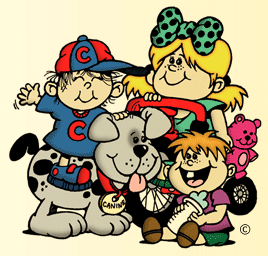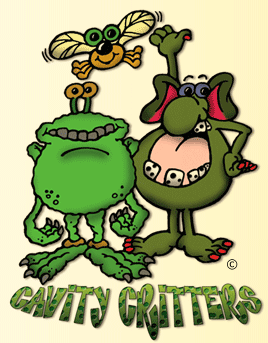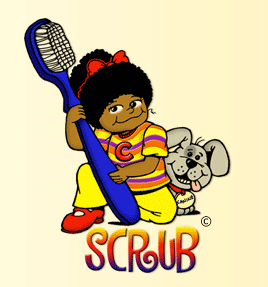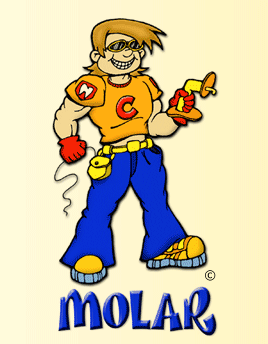Teething
Normally, the first tooth erupts between ages 6 to 12 months. The Jr. Squad knows that gums can be sore, tender and sometimes irritable until the age of 3. They recommend rubbing sore gums gently with a clean finger, the back of a cold spoon or a cold, wet cloth to help soothe the gums. Teething rings work well, but avoid teething biscuits as they contain sugar that is not good for baby teeth.
While your baby is teething, it is important to monitor the teeth for signs of baby bottle decay. Examine the teeth, especially on the inside or the tongue side, every two weeks for dull spots (whiter than the tooth surface) or lines. A bottle containing anything other than water and left in an infant's mouth while sleeping can cause decay. This happens because sugar in the liquid mixes with bacteria in dental plaque, forming acids that attack the tooth enamel. Each time a child drinks liquids containing sugar, acids attack the teeth for about 20 minutes. When awake, saliva carries away the liquid. During sleep, the saliva flow significantly decreases and liquids pool around the child's teeth for long periods, covering the teeth in acids.
Good Diet and Healthy Teeth
The teeth, bones and soft tissue of the mouth require a healthy, well-balanced diet. A variety of foods from the five food groups helps minimize (and avoid) cavities and other dental problems. Most snacks that children eat cause cavities, so children should only receive healthy foods like vegetables, low-fat yogurt and cheeses, which promote strong teeth.
Infant Tooth Eruption
A child's teeth actually start forming before birth. As early as 4 months of age, the primary or “baby” teeth push through the gums-the lower central incisors are first, then the upper central incisors. The remainder of the 20 primary teeth typically erupt by age 3, but the place and order varies.
Permanent teeth begin eruption around age 6, starting with the first molars and lower central incisors. This process continues until around age 21. Adults have 28 secondary (permanent) teeth-32 including the third molars (wisdom teeth).
Preventing Baby Bottle Tooth Decay
The Jr. Squad suggests not allowing sleeping infants to breast or bottle-feed in order to keep the Cavity Critters away from infants. Infants that need a bottle to comfortably fall asleep should be given a water-filled bottle or a pacifier. The Jr. Squad is dedicated to fighting baby bottle tooth decay. Let us know if you notice any signs of decay or anything unusual in your child's mouth.
Good Oral Hygiene
Scrub lets parents know how important a role they play in their child’s oral hygiene routine. She says that before teeth erupt, parents should clean their infant’s gums after each feeding with a water-soaked infant cloth to stimulate the gums and remove food. When the baby’s teeth erupt, parents should use a small, soft-bristled toothbrush and a pea-sized amount of fluoridated toothpaste.
Scrub wants children to know how much fun brushing can be! And it’s real simple, too! When you brush your teeth, move the brush in small circular motions to reach food particles that may be under your gum line. Hold the toothbrush at an angle and brush slowly and carefully, covering all areas between teeth and the surface of each tooth. Brush up on the lower teeth, down on the upper teeth and the outside, inside and chewing surface of all of your front and back teeth. Brush your tongue and the roof of your mouth before you rinse. Scrub brushes her teeth four times a day (in the morning after breakfast, after lunch or right after school, after dinner and at bedtime) and recommends the same to all the kids!
Molar agrees with Scrub and adds that flossing should also be a part of a child’s daily routine at the right age. Flossing can help reach places that brushing alone can’t and can help discourage the Cavity Critters. After pulling a small length of floss from the dispenser, wrap the ends of the floss tightly around your middle fingers. Guide the floss between all teeth to the gum line, pulling out any food particles or plaque. Unwrap clean floss from around your fingers as you go, so that you have used the floss from beginning to end when you finish. Floss behind all of your back teeth. Molar always makes sure to floss at night so his teeth are squeaky clean before going to bed!








